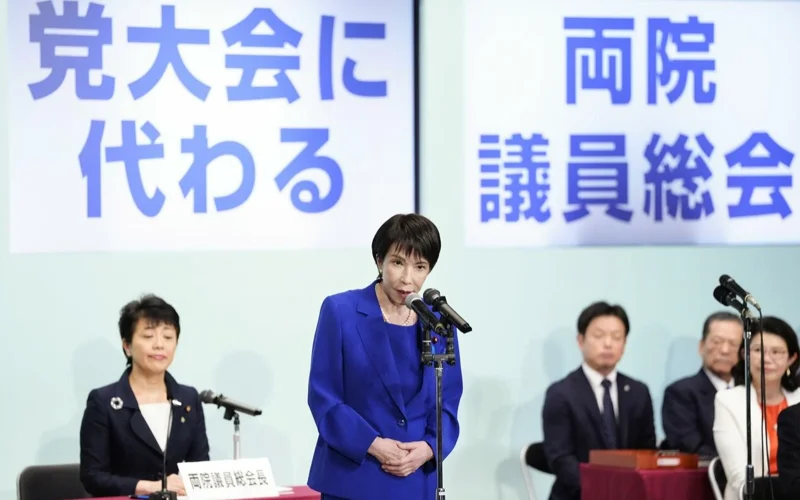Sanae Takaichi picked as Japan's ruling LDP head, likely to become 1st female PM
Former internal affairs minister Sanae Takaichi won the ruling Liberal Democratic Party's presidential election on Saturday by defeating farm minister Shinjiro Koizumi in a runoff vote, paving the way for her to become Japan's first female prime minister, Kyodo reports.

Replacing outgoing Prime Minister Shigeru Ishiba, Takaichi, 64, is also the first woman to assume the ruling party's top post, while her hawkish stance on diplomacy and security is expected to spark fresh friction with Asian neighbors such as China and South Korea.
Takaichi won 185 votes in the runoff against Koizumi's 156. Among the five candidates in the first round, the two LDP lawmakers along with Chief Cabinet Secretary Yoshimasa Hayashi were widely seen as the leading contenders.
The leadership race took place amid growing political uncertainty after the coalition with its junior partner, the Komeito party, lost its majority in both houses of parliament, the first such situation since the LDP was founded in 1955.
"The LDP marks a new era," Takaichi, known as a staunch conservative lawmaker, told her fellow lawmakers after being elected. She pledged that the party, which has held power almost continuously for 70 years, will turn people's "anxieties into hope."
Takaichi shares the security views of assassinated former Prime Minister Shinzo Abe. Her periodic visits to the controversial war-linked Yasukuni shrine in Tokyo have drawn sharp criticism from Beijing and Seoul.
Her term will last two years until September 2027, completing the remainder of Ishiba's original three-year tenure after he stepped down.
In last year's leadership election, contested by a record nine candidates, Ishiba, once regarded as a reform-minded outsider within the LDP, trailed Takaichi in the first round but prevailed in the runoff.
Takaichi is likely to be chosen as the next prime minister at an extraordinary parliament session, expected around Oct. 15, as the minority coalition remains the largest force and opposition parties remain divided.
Given that the LDP-led ruling bloc requires some opposition support to pass bills and budgets, Takaichi is set to face the task of working with other parties as the public struggles with rising living costs.
Takaichi, a former TV personality seen as a fiscal dove by market participants unlike Ishiba, has expressed willingness to boost the issuance of deficit-covering government bonds to fund measures aimed at economic growth.
She has also vowed to tighten screenings of foreign investment to safeguard economic security, and to introduce stricter rules on visa overstaying and land acquisition by nonresident foreigners.
Policy toward foreigners drew public attention in the July 20 House of Councillors election, which saw gains by a small populist opposition party promoting a "Japanese First" slogan.
Takaichi faces personal challenges. She takes care of her husband, who suffered a stroke that left him paralyzed on his right side, and has spoken of her own health struggles, saying she failed to recognize menopause symptoms and left them untreated, which led to rheumatoid arthritis and eventually required an artificial joint.
But she told LDP members following her victory in the leadership election, "I will have everyone work like a workhorse. I myself will abandon the idea of work-life balance. I will work, work, and keep on working."
Takaichi was the leading choice among the public, while Koizumi, 44, son of former Prime Minister Junichiro Koizumi, enjoyed the strongest support among his fellow lawmakers, according to media polls ahead of the election.
In the runoff, however, 149 lawmakers backed Takaichi, compared with 145 for Koizumi, who had been widely viewed as likely to become Japan's youngest postwar prime minister.
Koizumi has been hit by a scandal involving his campaign encouraging supporters to post positive online comments about him during a live-streamed press conference, raising concerns about transparency and fairness in political communication.
Hayashi, 64, a dovish moderate with extensive ministerial experience, quickly closed the gap with Takaichi and Koizumi ahead of the poll, but came up short.
The other contenders were former economic security minister Takayuki Kobayashi, 50, and former Foreign Minister Toshimitsu Motegi, 69. Like Hayashi, both graduated from the prestigious University of Tokyo and earned master's degrees from Harvard.
In early September, Ishiba announced his intention to step down to take responsibility for the ruling bloc's loss of majority in the upper house election in July.
The coalition also lost its majority in the House of Representatives election in October 2024 under the leadership of Ishiba, who had only become prime minister earlier in the month.
Earlier, it was reported that Japan's ruling Liberal Democratic Party will elect a new leader in its presidential election today.
